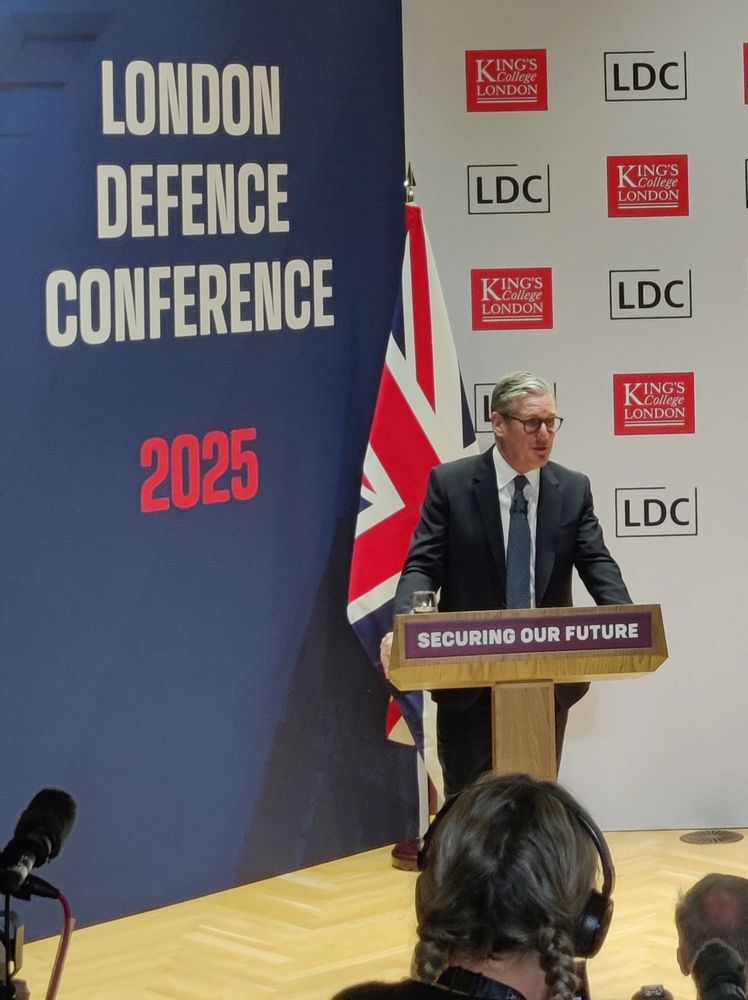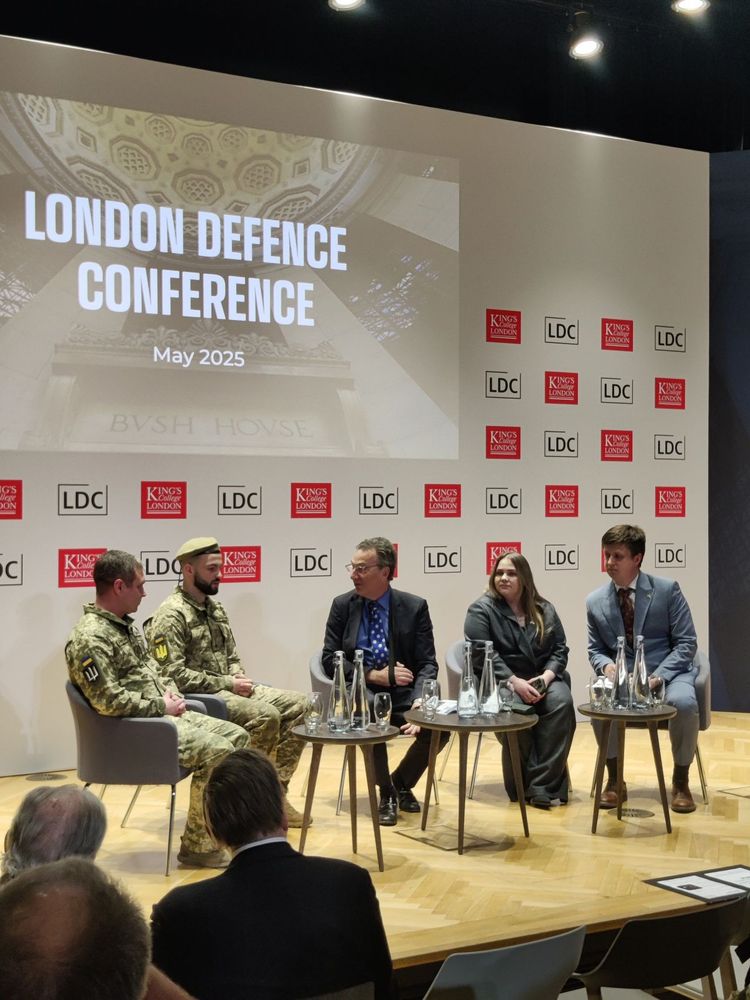Access Restricted
Apart from the silly rightwing quips by the author, this is a fascinating strategic analysis.
'Putin is losing the war, so prepare for escalation' share.google/0UCU79em6QFx...
11.10.2025 10:50 — 👍 0 🔁 0 💬 0 📌 0
Hear me now! Well, soon...
07.10.2025 14:03 — 👍 3 🔁 1 💬 0 📌 0
Going to Salzburg to talk about Large Language Model research in IR was fun!
26.09.2025 12:23 — 👍 1 🔁 0 💬 0 📌 0
National Security and Defence Documents Dataset (1987-2024) v2.0
Analysis is based on sentence-level semantic search of inductively-discovered threat topic groups, filtered to include the word 'threat'. Data sourced from the Edinburgh National Security and Defence Documents dataset. datashare.ed.ac.uk/handle/10283...
26.06.2025 09:25 — 👍 0 🔁 1 💬 0 📌 0
State-sponsored threats:
Both espionage and sabotage emerge as prominent concerns in 2025—espionage doubling from the 2020-2023 baseline whilst sabotage appears as an entirely new threat category—reflecting intensified state competition and the targeting of critical national infrastructure.
26.06.2025 09:25 — 👍 0 🔁 1 💬 1 📌 0
Missile threat salience rose 90% in 2025, likely driven by proliferation of advanced ballistic and hypersonic capabilities amongst adversarial states and the erosion of traditional arms control frameworks.
26.06.2025 09:25 — 👍 0 🔁 1 💬 1 📌 0
Hybrid warfare salience increased 67% by 2025, indicating growing governmental concern over coordinated grey-zone operations that blur the boundaries between peace and conflict through disinformation, cyberattacks, and economic coercion.
26.06.2025 09:25 — 👍 0 🔁 1 💬 1 📌 0
AI and emerging technologies:
Artificial intelligence appears as a discrete security threat for the first time in 2025, marking official recognition of AI's dual-use potential and autonomous systems vulnerabilities in an increasingly technology-dependent security landscape.
26.06.2025 09:25 — 👍 0 🔁 1 💬 1 📌 0
Military/Traditional Threats:
Military threats peaked early (2002-2003) and have maintained consistent but lower-level attention, with recent uptick in 2025, reflecting renewed conventional security concerns.
26.06.2025 09:25 — 👍 0 🔁 1 💬 1 📌 0
Climate: emerging priority
Climate-related security concerns were absent from early documents but emerged in 2009 and peaked in 2020. Notably, explicit mention climate threats have disappeared entirely from 2025 documents, suggesting a possible shift in framing or priorities.
26.06.2025 09:25 — 👍 0 🔁 1 💬 1 📌 0
Nuclear: persistent concern
Nuclear threats have maintained steady relevance throughout the period, with notable spikes in 2008 and consistent presence in recent documents.
26.06.2025 09:25 — 👍 0 🔁 1 💬 1 📌 0
Cyber: rise and plateau
Cyber threats first gained significant attention in 2009 and peaked in 2015. Unlike terrorism, cyber threats have remained consistently present but at lower levels recently.
26.06.2025 09:25 — 👍 0 🔁 1 💬 1 📌 0
Terrorism: declining
Terrorism emerged as the primary security concern post-9/11, peaking during 2008-2009 and maintaining high levels through to 2018. However, there's been a marked decline in recent years.
26.06.2025 09:25 — 👍 0 🔁 1 💬 1 📌 0
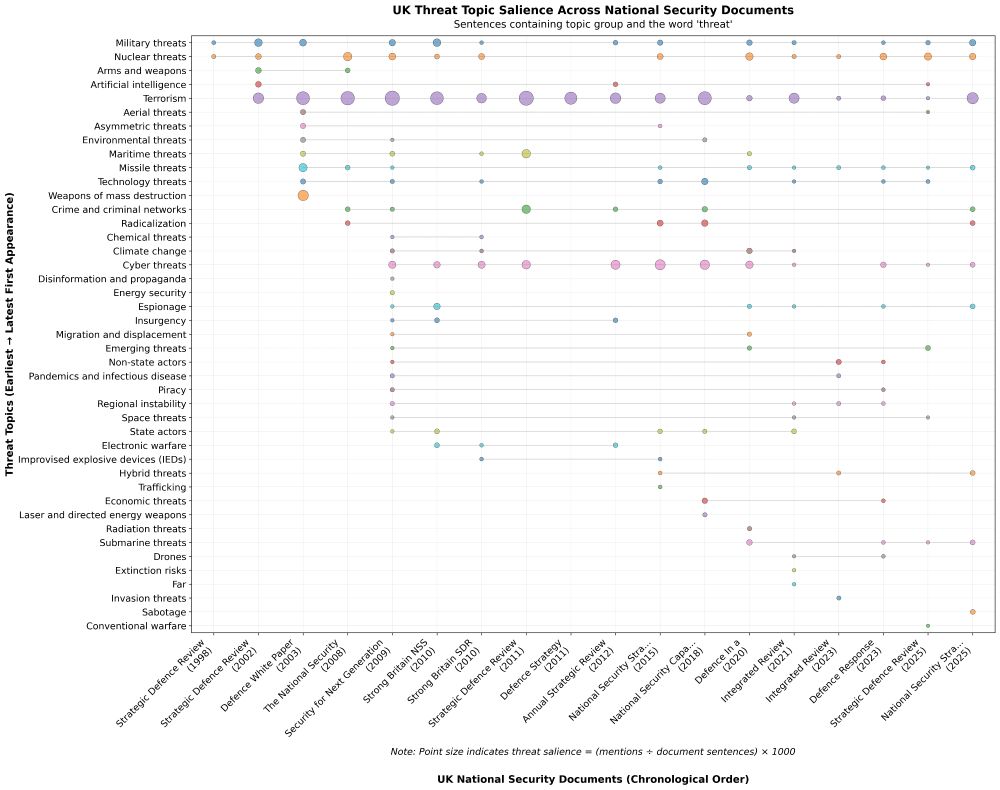
In response to the new UK National Security Strategy and SDR, here's my analysis of changing threat topics in UK national security and defence documents since 1998.
@uoe-sps.bsky.social @scga.bsky.social @rethinkingsecurity.bsky.social @chathamhouse.org @rusi.bsky.social @edinburghpir.bsky.social
26.06.2025 09:25 — 👍 5 🔁 4 💬 1 📌 0
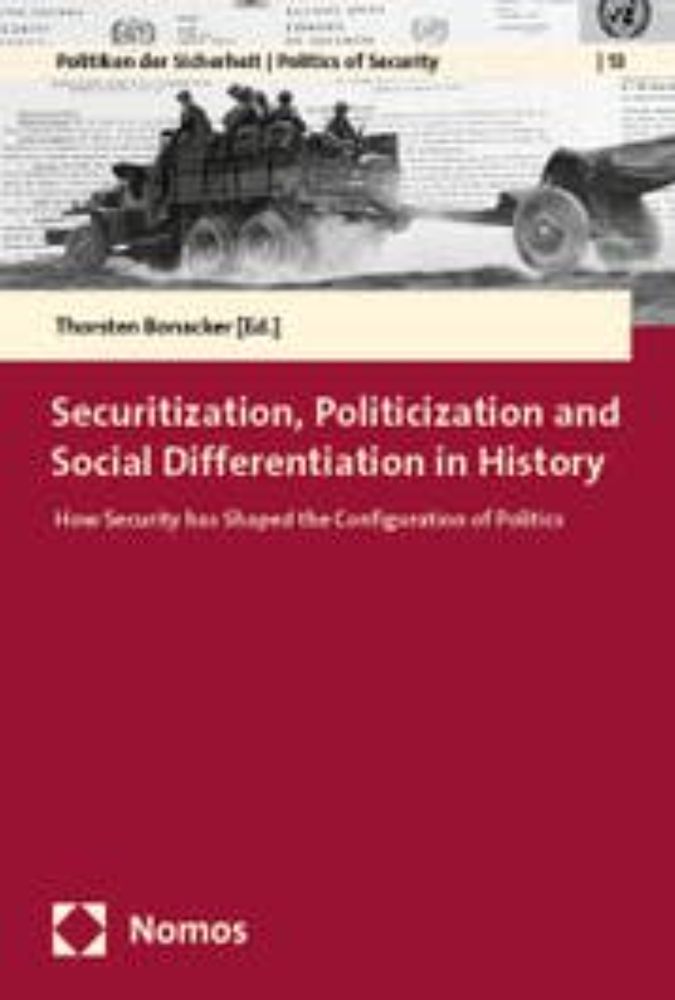
Securitization, Politicization and Social Differentiation in History
My chapter "NATO accession, democratization, and security sector reform" is out! I examine SSR & democratisation in CEE, highlighting how historical positionality shapes understanding.
Explore the book (ed. @tbonacker.bsky.social): edin.ac/3FOOB4c
#SecurityStudies #Democratisation #PoliticalScience
12.06.2025 15:02 — 👍 3 🔁 0 💬 0 📌 0
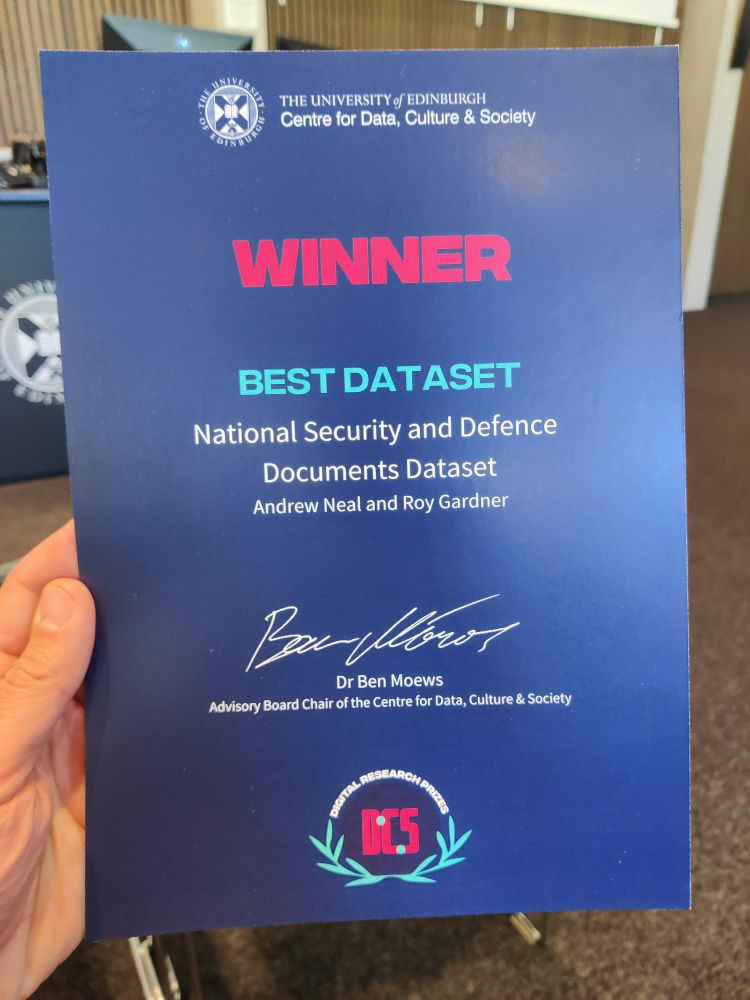
Happy to win this little internal prize for my National Security and Defence Documents Dataset (1987-2024) 😊
datashare.ed.ac.uk/handle/10283...
23.05.2025 16:03 — 👍 7 🔁 0 💬 1 📌 0
🤣
16.05.2025 17:29 — 👍 0 🔁 0 💬 0 📌 0
'You could go off to the Shetlands with a shovel and cut off the internet to the Faroe Islands fairly easily if you wanted to'
I somehow managed to say this BBC Radio Scotland. I hope nobody gets any ideas 😂
They don't call me Professor of International Security for nothing you know.
16.05.2025 16:51 — 👍 2 🔁 0 💬 1 📌 0
A fascinating few days at the London Defence Conference. Quite an eye opening range of views from a mixed defence industry/policy/academic crowd, very hawkish at times (perhaps unsurprisingly). I had to remind myself that it's just one sector among many.
11.05.2025 15:22 — 👍 0 🔁 0 💬 1 📌 0
OMG. The revolution may not be televised, but the war will be memed on TikTok.
08.04.2025 06:44 — 👍 0 🔁 0 💬 0 📌 0
I have tariffed
the penguins
that are on
Heard Island
and which
you were probably
assuming
did not export goods
forgive me
they were taking advantage of us
so cunning
and so cold
03.04.2025 19:45 — 👍 28924 🔁 7074 💬 557 📌 340
@dandrezner.bsky.social not mincing his words
03.04.2025 11:45 — 👍 1 🔁 0 💬 1 📌 0
@rethinkingsecurity.bsky.social @scga.bsky.social @mybisa.bsky.social @isanet.bsky.social @uoe-sps.bsky.social @chathamhouse.org @rusi.bsky.social @britishacademy.bsky.social @peacerep.bsky.social @duckofminerva.bsky.social @warontherocks.bsky.social @nupinytt.bsky.social @sipri.org
01.04.2025 11:11 — 👍 1 🔁 0 💬 0 📌 0
LinkedIn
This link will take you to a page that’s not on LinkedIn
Download now: Edinburgh DataShare doi.org/10.7488/ds/7...
Please share!
#InternationalRelations #DefencePolicy #SecurityStudies #DataScience #ComparativePolitics #NLP
01.04.2025 11:11 — 👍 0 🔁 0 💬 1 📌 0
- No advanced ML knowledge required to use the basic search features
- Ideal for researchers in international relations, security studies, defence policy, as well as policymakers, civil society organisations, and educational institutions interested in global security priorities.
01.04.2025 11:11 — 👍 0 🔁 0 💬 1 📌 0
Technical skills needed:
- Basic Python knowledge for running the semantic search tools
- Familiarity with Jupyter notebooks to explore the data
- Understanding of NLP concepts helpful but not essential
01.04.2025 11:11 — 👍 0 🔁 0 💬 1 📌 0
- Natural Language Processing tools for analysing document content
- Jupyter notebooks for data exploration and visualisation
- Reproducible code for computational text analysis
01.04.2025 11:11 — 👍 0 🔁 0 💬 1 📌 0
PhD researcher, University of Salzburg
Centre of European Union Studies (SCEUS)
European Parliament | EU trade policy | European governance | Geopoliticization | Text-as-data
Political science postdoc at University of Salzburg/DEUDEM project.
Interested in elections, political behaviour, public opinion & quantitative methods.
She/her.
Political Scientist @leiden.
PI of ERC MIDEBT project studying opinions on public debt (midebt.org), AI, and security.
Assc. Editor ISR.
Co-founder REALdegrees.ai
ETH Zurich | Assistant prof | EU politics
Lise Meitner Fellow (political scientist) at the University of Salzburg & Salzburg Centre of EU Studies (@sceus.bsky.social) 🇦🇹 PhD from the EUI 🇮🇹 Ancora Imparo. Visit https://markus-gastinger.eu/ for more.
Professor of Political Science Methods at @unisalzburg.bsky.social • Editor at @ejprjournal.bsky.social • Studies Populism and Climate Politics • Previously University of Reading and ETH Zurich • More info: www.robertahuber.com
Political Science Postdoc // University of Salzburg // INCONEX // Party Leaders // part of the TaDa Reading Group - tada.cool // www.clintclaessen.com
Gold Open Access journal from the European Consortium for Political Research (ECPR) https://www.tandfonline.com/toc/prxx20/current
Publishing original and substantial contributions to the study of comparative European politics. A journal from the European Consortium for Political Research (ECPR) https://ejpr.onlinelibrary.wiley.com/journal/14756765
European Political Science Review (EPSR) is an #OpenAccess journal of the European Consortium for Political Research (ECPR).
IR Scholar & Lecturer | PhD Candidate | Energy Geopolitics, Int'l Security, Institutionalism & Global Governance | Eurasia Africa
Fostering innovation and effective leadership.
Reposts & Links≠Endorsement
https://martinzubko.com/
Host of @irthinker.com
Senior Lecturer in IR at University of St Andrews | Historian of war | Award-winning author | Series editor, War & the British Empire (McGill-Queen's UP) | I research the First World War, military innovation & learning, and gossip in the armed forces.
Freelance journalist - climate, renewables, environment & more. Can assist with web content, white papers, copywriting & more (enq robinwhitlock1966 @ gmail.com ). WSM UK. NUJ. Over 10 years experience. Sea shanty singer with The Steepholmers. 🇵🇸🇮🇱
Professor of Political Science, University of Copenhagen. Research interests: European and Nordic Politics, Political Economy. Collector of modern ceramics, Faroese paintings and Christine Swane paintings. Lifelong fan of Bob Dylan and modernist poetry.
Author, Speaker, Peace Researcher: josef.muehlbauer@uni-graz.at
Master of (Keeping/Stealing) your Secrets | Security Advisor & Intel Analyst | Civil Servant @ BE | Klopjacht-speurder | IT Eng. + Pol. Sci. | Posts my own
Professor for Peace & Conflict Studies @Center for Conflict Studies U Marburg * Research & teaching international statebuilding, United Nations in decolonisation, postwar justice, political violence * SFB 138: Dynamics of Security




